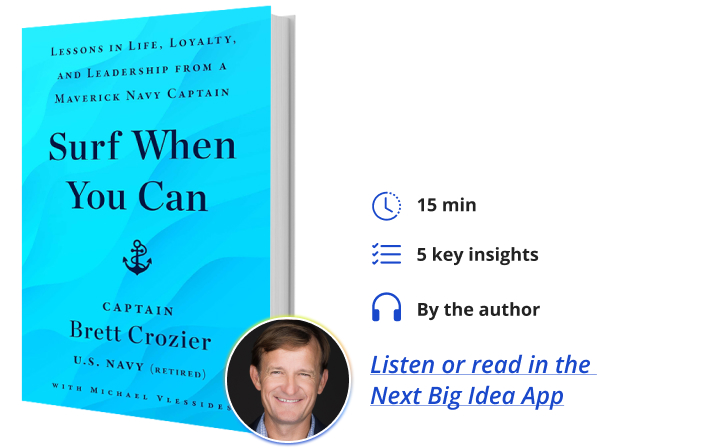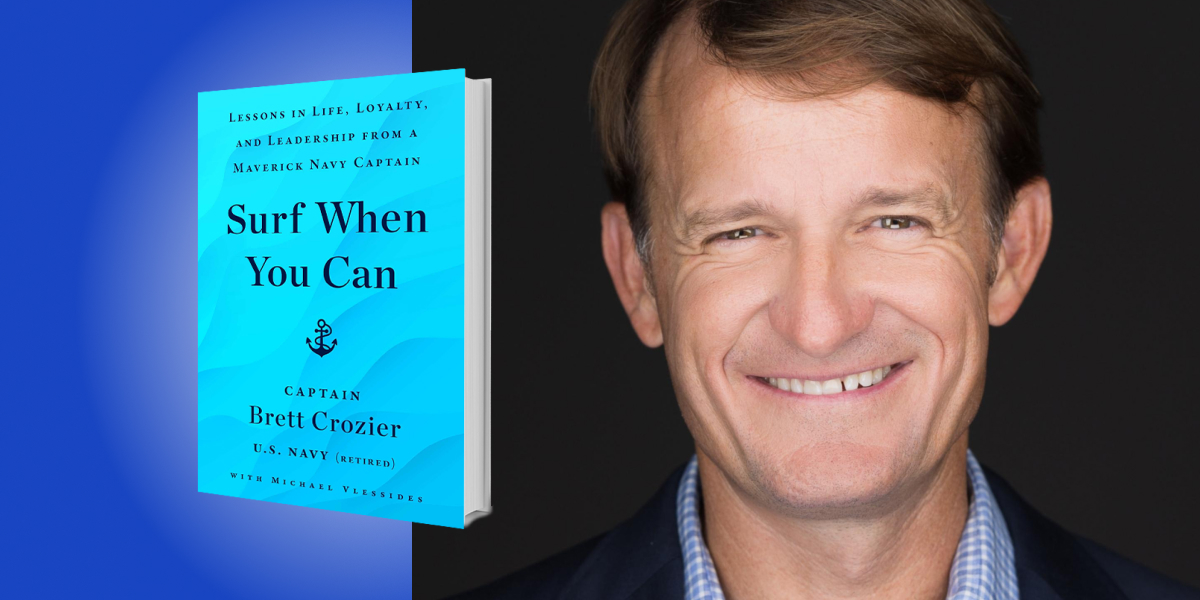Brett Crozier graduated from the United States Naval Academy and is a former Navy Captain and commanding officer. He now works as Chief Operating Officer for Veterans Village of San Diego. Below, he shares five key insights from his new book, Surf When You Can: Lessons in Life, Loyalty, and Leadership from a Maverick Navy Captain. Listen to the audio version—read by Brett himself—in the Next Big Idea App.

1. Never turn down an espresso.
During my career, my family and I were stationed in Naples, Italy, a chaotic city that’s often called “a pretty lady with dirty feet.” Professionally, my days in Naples were almost exclusively spent in an office doing staff work. It was not a favorite situation for a Navy fighter pilot fresh from a squadron tour, but I knew I could get the job done. It’s very easy for Americans to wear our work ethic as a badge of honor: we are tough, we work hard, and we work a lot.
This was my personal bias as I walked into work that first day. I was part of a 12-nation NATO staff of just over 100 people whose goal was to coordinate military operations throughout the Mediterranean region. While I love coffee as much as the next person, the Italians really love their coffee. They would stop whatever they were doing several times a day to venture out to a local café for an espresso and, in their classic Italian way, they’d always invite everyone in the office to join them. Every day, a co-worker and Lieutenant Colonel in the Italian Army named Luigi would invite me to coffee. Every day, thinking there was always too much work to do, I’d politely refuse.
Finally, one day Luigi spoke up. “Chopper,” he said using my call sign, “Americans think that if they work hard, we’re going to trust them. What you really need to do is spend time with us outside of work, so we can get to know you, then we will trust you; that’s the essence of trust.” I considered Luigi’s comments and realized he was probably right. Here we had been working elbow-to-elbow for months, but I knew very little about him, other than his professional duties and responsibilities. It was the same with the rest of the team as well. So, I started going with Luigi and the others for an espresso.
Eight months later, NATO was called into action when Gaddafi mobilized his forces against his own people after a series of anti-government rallies had been organized in Benghazi, northern Libya. As the protests intensified, Gaddafi began using lethal force against them. In a surprisingly swift fashion, the UN Security Council condemned his actions, and our NATO staff became very busy. However, in those hectic, stressful moments, when there was a seemingly insurmountable amount of work to get done and lives on the line, the Europeans, whom I had once criticized for always dashing off for an espresso, were right there beside me, working day and night. They refused to go home until I did, and they were never afraid of hard work. Through it all, we continued our espresso breaks.
That experience reminded me to “never turn down espresso,” or more specifically, that life is about relationships. A team is stronger when the connections between its parts are stronger. That certainly proved true during my time in the Navy, and it is true in life as well.
2. Pull like a Clydesdale.
While working as Executive Officer, or XO, the number two in charge on an aircraft carrier, I worked closely with a Senior Chief who was the lead person in charge of the ship’s Damage Control program. His responsibilities were many and included everything related to emergency services: fire prevention, firefighting, and damage control; even things like chemical, biological, and radiological warfare defense. Senior had not only seen some stuff through his career, but he had risen through the ranks to the point where he was directly in charge of a team of 100 sailors, and responsible for the firefighting training of all 5,000 sailors onboard. He was an exceptionally quiet and matter-of-fact guy, so when he actually had something to say, my ears perked up, even when I wasn’t sure if he was pulling my leg or not.
“We are stronger when we work together.”
“Hey XO,” he said one day as we sat in Damage Control Central, the room on a carrier that’s used to monitor the entire status of the ship. “How much weight do you think a Clydesdale can pull?” “I don’t know, Senior,” I replied. “Maybe 5,000 pounds.” “You’re pretty close, Sir,” he said. “It’s somewhere between 2,000 and 8,000, but no more than 8,000 pounds. Now, how much weight can a team of two Clydesdales pull?” I wasn’t sure what he was getting at, but I played along. “Somewhere between 4,000 and 16,000 pounds, but 16,000 tops,” I said, my math degree quickly helping out. “Wrong,” he said. “When they work together, two Clydesdales can pull 24,000 pounds, and if properly trained, up to 32,000 pounds.” The math didn’t work. “Sure it does, Sir,” he said.
With that, he stood up and walked away, leaving me to chew on the little nugget he had shared with me. The Senior Chief never spoke with me about it again, but the essence of his message was a reminder of what I had learned on the ballfields as a kid, and continued to relearn, whether airborne or at sea, throughout my career: We are stronger when we work together.
Whether you’re in the military or not, you can accomplish a lot more as part of a team. So always strive to “Pull like a Clydesdale.” Being part of a team doesn’t diminish our capabilities, it enhances them. As a leader, strive to assemble a group of people who understand their collective goal, the importance of what they’re doing, and each person’s value to the organization. With that, there’s no limit to what that team can accomplish.
3. Focus on the closest alligator.
In the world of Navy fighter pilots—where situations can change on a moment’s notice—we’ve taken liberties with Covey’s quote, “Keep the main thing the main thing.” We’ve modified it so it’s a bit more relevant to our profession, “Always focus on the alligator closest to the canoe.” The assumption here is that any alligator near the canoe can be a life-or-death threat, but the closest one is your greatest priority at any given time.
When flying, this means that if there are several things going on, and there are always several things going on, you start by prioritizing the closest (and therefore biggest) threat. For example, if I’m low on fuel and the only safe place to land is on an aircraft carrier, I tune out every other aspect of the mission to that point and only focus on a smooth landing before running out of gas.
This is especially important today when life seems more fragmented than ever. In a world of lightning-fast communications, cell phones that never seem to leave our sides, and astoundingly short attention spans, there is always someone or something trying to grab our attention. With so many choices and so many distractions, how do we get the job done?
By focusing on the closest alligator, you learn how to prioritize, figuring out what’s important in your life at any given moment. Of course, a big part of this will always be work, whether you’re employed by a large corporation, a small company, or if you’re self-employed. You are most effective, and most valuable to your employer, when you can see the big picture and address those tasks that are most vital at any given moment.
“Learn to take a step back from the everyday noise of our lives and allow ourselves the opportunity to set our priorities.”
Alligators certainly don’t end there; you can prioritize in your personal life as well. On any given weekend, you might feel like you’ve got a thousand things to get done: cleaning and laundry or seeing friends and family. If you’re not careful and don’t prioritize beforehand, you’re likely to get to Monday morning and realize that, while you were busy all weekend, you didn’t actually accomplish anything. It’s a subtle distinction, but an important one.
The same principles can actually be applied to family life. The stresses of work and professional responsibilities can be difficult for all of us, no matter what kind of job we have. As a Navy Captain in charge of a $10 billion aircraft carrier, my responsibilities were often legion. There was always something else to take care of, always another call that needed to be made, always another email to respond to, no matter what time of the day or day of the week. If I wasn’t careful, the job could easily have consumed me.
However, keeping the main thing in mind, focusing on the closest alligator makes all the difference. Few of us will ever find ourselves defending a canoe from fearsome reptiles, flying combat missions in an FA-18, or driving a 1,000-foot nuclear-powered ship through foreign waters. However, that doesn’t mean we can’t learn to take a step back from the everyday noise of our lives and allow ourselves the opportunity to set our priorities for that day, week, month, or year. Whether we’re sitting at our desks at work or simply kicking back on a Friday night and deciding what the weekend holds, we can still set priorities.
4. Play small ball.
As a kid growing up in California, baseball was a big deal. We listened to it, we watched it, we talked about it, and we played it. A lot. While I was never good enough to play for my beloved San Francisco Giants, I did play in the Rincon Valley Little League Majors, the next-best thing. The best team I ever played on as a kid was the Dragons, led by our larger-than-life Coach Ray, who proved to be a memorable figure in my life, though I was just a boy of twelve when I met him.
A huge man, who also happened to be a California Highway Patrol officer, Coach Ray was a stickler for the fundamentals. Under his guidance, I and all the other kids on the team mastered the foundational elements of the game and we carried these fundamentals with us throughout our little league careers. I remember him hitting grounder after grounder to me at third base, a seemingly endless barrage of balls hit in my general direction. All with a singular collective purpose: to reinforce the importance of learning how to do the little things right. I didn’t know it at the time, but Coach Ray was teaching me the value of what baseball aficionados call small ball.
In small ball, a team relies on the fundamentals to win games. On the offensive side, singles and walks are as valuable as extra-base hits. Advancing runners through steals, bunts, hit-and-runs, and sacrifices is every bit as important as waiting for the long ball to clear the bases. In the field, teams that play small ball are defensive masters and rarely give their opponents the gift of free runs.
“Master the fundamentals, and you’ll find it much easier to navigate the path to success.”
Surprisingly, the same approach can be found in the Navy. In a military setting, training is as elemental as breathing. Your training dictates how efficiently your ship runs, how well your crew responds in critical situations, and how effectively you can face adversity. As an aircraft carrier pilot, small ball meant practicing landings hundreds of times before progressing to doing them on the deck of an aircraft carrier. Starting in the simulator, then eventually graduating to runways, every landing was critiqued and graded. Only after expertly demonstrating proficiency in the fundamentals are you allowed to graduate to the real deal and land on an aircraft carrier at sea, and even then, you’re assessed every time you touch down. I may have risen to become the commanding officer and senior pilot onboard the USS Theodore Roosevelt many years later, but every single time I flew in an F/A-18, my landings on the carrier were scrutinized for how well I performed the fundamentals.
I’ve tried to take the value of small ball through everything, both in and out of the military. In combat, you cannot afford to lose. In the civilian world, the consequences may not be as dire, but the message is the same. Master the fundamentals, and you’ll find it much easier to navigate the path to success. In the end, we practice not until we get it right, but so we never get it wrong. So while on the inside you may just be a 12-year-old kid who’s tired of fielding grounder after grounder after grounder, there’s no arguing with the results. Doing the little things well, and executing them perfectly is just as important. Small ball actually does win games, both on the field and in life.
5. Surf when you can.
A famous philosopher once said, “Life moves pretty fast. If you don’t stop and look around once in a while, you could miss it.” That was of course the legendary philosopher Ferris Bueller. If I had to guess, I think he’d say that surfing was a good way to slow down and look around. When I arrived at my first Navy Squadron in Barbers Point Hawaii to join the HSL-37 Easyriders helicopter squadron, we surfed as a squadron every Friday morning at the local break.
Over the course of the tour, I found that for me, surfing represented balance. It was a conscious commitment to every aspect of my health and wellness, from the physical to the emotional to the spiritual. Believe it or not, it was because of this commitment to the things outside of work that I was able to thrive in work.
As a Navy Captain, I had the privilege of experiencing the ocean in all her moods. At times it was so calm we could carve slow circles in the water with the carrier and eventually catch up with the white and blue mosaic of the ship’s wake before it faded into the depths below. At other times, the sea was an unforgiving bedfellow, with waves so massive they crashed over the flight deck, 60 feet above the surface.
Yet no matter what the sea threw at me over the course of those thirty years, I never stopped appreciating the perspective she offered. From my place on the bridge of the aircraft carrier, with the horizon stretching forever before me, it made me realize just how small I was in the world.
I think that’s why I have become such a staunch defender of my personal time and passionate about surfing, or anything that lets me enjoy the ocean. No matter where you dip your toes, surfing has a way of slowing you down. It’s an opportunity for you to disconnect from all the parts of your life, the calls, the texts, the emails, the demands, the stress, to simply be on the water. For me, surfing represents pressing the pause button on everything else to stop, look around, and breathe.
Striking a meaningful balance between work and life is a critical element in everyone’s happiness, leader or not. So, whether your surfboard is a church, a set of golf clubs, a basketball, or a yoga mat, the message rings true all the same—surf when you can. You’ll enjoy life more, and you’ll likely be better at work as a result.
To listen to the audio version read by author Brett Crozier, download the Next Big Idea App today:































